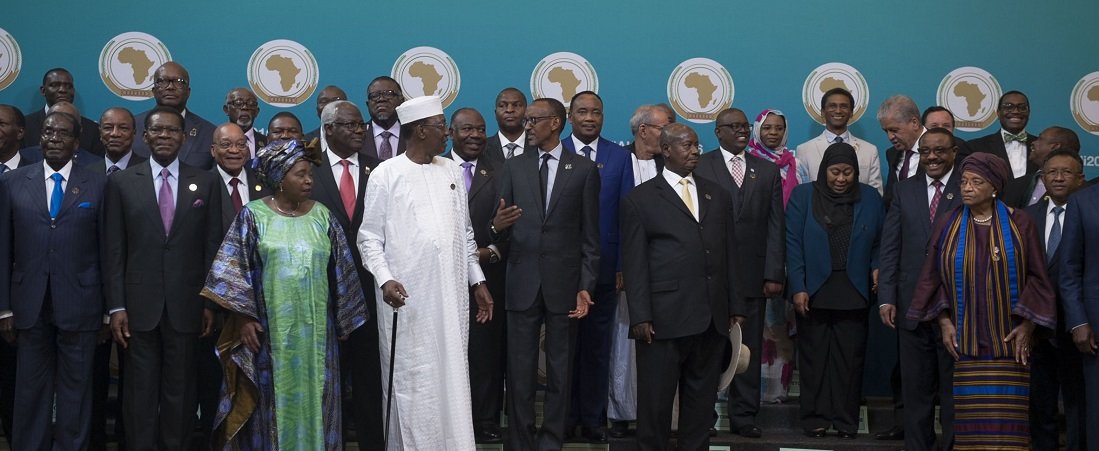You could be forgiven for missing the 27th African Union Summit in Kigali, Rwanda in a week of coups and terror attacks. But the Summit – held twice a year – could prove to be one of the most significant yet. Here’s what happened:
Civil war in South Sudan
The world’s youngest country recently cancelled its fifth independence anniversary, after the fragile peace deal struck in August 2015 unravelled. With hundreds dead and an estimated 50,000 people fleeing their homes, AU Commission Chair Nkosazana Dlamini-Zuma addressed the issue in her opening speech: “Enough is enough. The violence in South Sudan is unacceptable.”
African leaders backed plans to deploy regional troops, with soldiers expected to come from Ethiopia, Kenya, Rwanda, Sudan and Uganda. AU Peace and Security Commissioner Smail Chergui said at the Summit: “African troops are ready to engage in very difficult situations.” However, a similar commitment by the AU last year for crisis-hit Burundi was scrapped, after the country’s government condemned the action as an “invasion”.
Burundi – one year on
While Burundi may have slid down the news agenda, the ongoing turmoil was not far from the minds of attendees. Kigali, the host city, lies just 60km from the Burundian border. Last week’s assassination of Hasfa Mossi, a former government minister and member of the East African parliament, has brought Burundi’s civil strife back into sharp focus. The ongoing failure of the AU’s Peace and Security Council to broker dialogue in the country has left observers pessimistic about the organisation’s chances of brokering deals in other conflict zones like South Sudan.
Morocco – back in the fold?
The only non-AU African country, Morocco left the AU’s predecessor organisation in 1984 after it recognised the independence of Western Sahara. While the dispute has still not been resolved, the North African nation sent a special envoy to Kigali to lobby for Morocco’s readmission. King Mohammed VI confirmed the country’s intention to re-join on Sunday, stating in a message to the Summit: “Morocco wishes resolutely and unequivocally to regain its place within its institutional family and to continue to live up to its responsibilities, with even more resolve and enthusiasm.”
Eyes on Rwanda
After successfully hosting the World Economic Forum on Africa in May, Rwanda has cemented its position as an African events hub. The Kigali Convention Centre, inaugurated just days before the Summit, proved to be an impressive venue for the African leaders. This was another opportunity for this small nation to be a big player in the African political landscape. While President Idriss Deby of Chad took centre stage as Chairperson of the AU, he was overshadowed by Rwanda’s well-known leader, President Paul Kagame, who declared: “Unity is not a feel good slogan– it’s a tool for delivering real results in the lives of Africans.”
Zuma still in charge – for now
South Africa’s Nkosazana Dlamini-Zuma – Chairperson of the Africa Union Commission since 2012 – was expected to be succeeded at the Summit. However, the three candidates proposed as her replacement – Specioza Wandira Kazibwe, former Ugandan Vice President, Pelonomi Venson Moitoi, Botswana Foreign Minister, and Agapito Mba Mokuy, Equatorial Guinea Foreign Minister – failed to attain the two-thirds majority required to trigger an election.
Madame Zuma was elected in 2012, when South Africa broke the unwritten rule that larger nations should not go for the top job – the previous Commission Chairs have come from Gabon, Mali and Côte d’Ivoire. Madame Zuma is widely expected to return to South Africa to challenge her ex-husband, President Jacob Zuma, for the ANC leadership. This may still happen when she leaves her current post, which is now expected in January 2017.
African Passport
The launch of the AU passport at the Summit grabbed the headlines. The initiative aims to “realize the dream of visa-free travel for African citizens within their own continent by 2020”. However, this ambitious initiative is currently only available to senior African dignitaries, such as Heads of State, with no formal timeline for roll-out to ordinary African citizens. The launch comes on the back of encouraging initiatives from Ghana and the Seychelles, who are committed to providing visas on arrival for all citizens of AU member states. Moves like these will be more effective in boosting much-needed intra-African trade instead.

